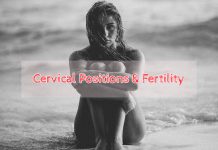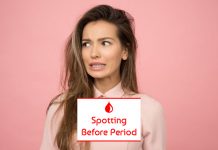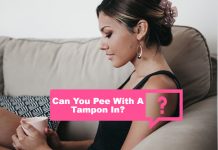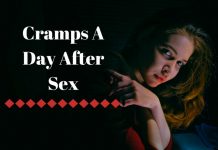While spotting and cramping during a period is something all women expect and tolerate, what are the causes of cramps after period?
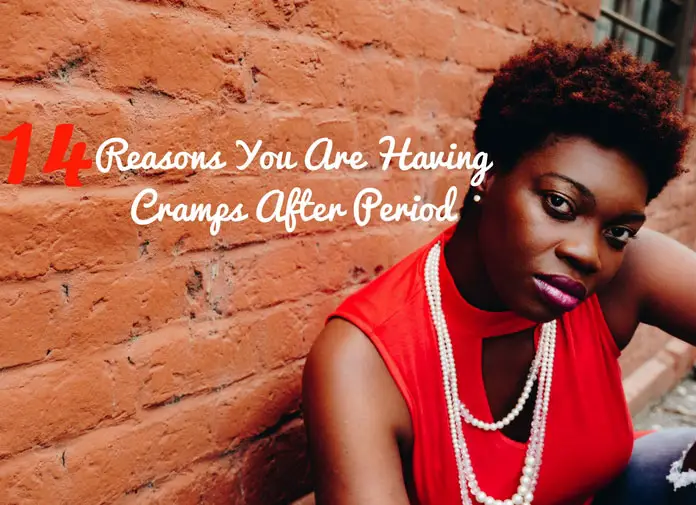
What Are Period Cramps?
Period pain and cramps are of two types – primary and secondary. Women who have severe pain during menstruation are said to have dysmenorrhoea.
Primary dysmenorrhea is because of period flow. The uterus wall contractions and pelvic pain in those days comes under it.
Secondary dysmenorrhoea can occur at anytime in the month. Cramps continuing after period is the result of secondary dysmenorrhoea. Lifestyle changes and prescription of NSAIDs can solve the underlying problem.
Unless you have some major gynecoloical disorder secondary dysmenorrhoea is mild. In patients with polyps or initial stages of cancer the pelvic pain after period gets unbearable.
How do period cramps feel like?
With cramps after a week from period, you want to find out if they’re period cramps at all. Period cramps have certain characteristics that differ them from implantation cramps and gas distress.
Pregnant women can also have period like cramps at different stages. Surely some symptoms will still allow their distinction from PMS cramps.
Here are the 5 typical signs of cramps due to period:
Pulsating pain – The pain keeps going low and then rises. There is no rhythm but as toh feel it’s going, there is a sudden wave of stronger pain. This happens on the first day.
Lower abdominal location – Every woman knows her period pain location. Some have vaginal pain and others have localised pain on the sides. Cramps after period won’t be in the same location.
Weird pain in near-by areas – Some women have discomfort in the surrounding region like the anal region. Cramps feel like acute gas distress.
Sharp and piercing sensation – Implantation cramps and period cramps differ mainly in the intensity. Early pregnancy cramps are mild. Period cramps after a week or two weeks should still be sharp.
Vaginal numbness – The pain numbs the vagina and all you feel is the area above. Blood coming out from vagina just feels like a warm flow from a barrel. You won’t feel it spreading on your vagina.
Tenderness – Cramping area looses the agile feel. Inflammation and swelling make it limp.
What causes menstrual cramps?
Cramps during a period are because of prostaglandin and uterine contractions. Prostaglandins are chemicals that send the pain signal to the brain.
They are also responsible for inducing labor.
Another class of chemical that releases during a period is leukotrienes. They are responsible for inflammatory response. The inflammation of the uterine lining causes pain.
The cervical path is not very wide before pregnancy, and so clots can clog the path and cause pain.
Another reason for cramping during a period is the presence of fibroids or scars that trap blood inside.
The oxygen supply to uterine lining cuts off during menses causing the death of cells.
It leads to the disintegration of the lining and bleeding. It is like wringing blood from the uterus.
Cramps after period
Cramping after a period for a day is attributed to the final loss of blood. The sloughing of the last layer of the endometrium causes cramps after the period ended.
But some conditions can cause prolonged cramping after the period ended. European Journal Of Obstetrics Gynecology and Reproductive Biology, published the mechanism of endometriosis pain.
Talking about how does endometriosis pain develop and feel, Matteo Morotti, affiliated to University Of Oxford, mentioned pain after period has ended.
What causes abdominal pain after menstruation?
There are many reasons for cramps after a period and many kinds of cramps. Restricting ourselves to abdominal cramping after the period, we will discuss the causes.
What causes cramps after period?
Cramps after period or secondary dysmenorrhea is a common event in adult women. Post-period cramps may be because of cysts or any medication.
Birth control methods can cause cramps randomly at any time of the month. Uterine fibroids and polyps can also cause a lot of pain.
Cysts torsion is another reason for cramps after a period. Cancers of the reproductive tract also cause painful spasms. Dysmenorrhoea is the painful menses.
This cramping lasts after a period because of certain complications in the reproductive organs.
Dyspareunia is the pelvic pain felt after the period is over. It is a painful condition that aggravates after intercourse.
Following are the reasons for cramps after a period:
1) Uterine fibroids
Any structure inside the uterus that blocks or bifurcates the uterus can cause cramps because the uterus cannot contract due to the fibers stretching in it. Uterine fibrous tissues are abnormal septum.
2) Endometriosis
When the tissue of uterus invades other organs, it is called as Endometriosis.
Is a sharp pain in the ovary after period Endometriosis?
Pricking pain and cramps after a period can be due to Endometriosis. It is possible that the uterine tissue is invading other parts.
3) Endometrial polyps
Polyps are a sessile tumor in the uterus. These cause blockage of menstrual blood. They cause painful spasms during and after the period.
Polyps require surgical procedures for treatment. They can even lead to infertility in women.
4) Cysts
Any cysts in ovaries or uterus can cause pain after the period ended. A cyst is an undifferentiated mass of cells that reduces the space in the womb.
Cysts cause pain during menstruation and cramping after a period.
5) Uterine incapacity
Uterine incapacity is the inability of the uterus to throw out blood during menstrual flow. The remaining blood requires more and more of contractions for expulsion.
But the contractions are not enough for throwing it out. Uterine incapacity is the reason for spotting and cramping after a period.
6) Cervical stenosis
When the cervix becomes narrow, it clogs any uterine debris. It causes immense pain as long as the clot of blood doesn’t move out. Cramps week after a period can be because of cervical stenosis.
7) Hormonal fluctuations
Hormonal imbalance can cause cramping and disturb the menstrual cycle. If your hormonal cycle is not regular, then the phase of the menstrual cycle will overlap and cause cramps and pain.
The developing oocyte will also not compete, and early ovulation cramps can happen.
8) Birth control
All birth control methods except condoms have some side effects. After the period when you begin a new course of birth control, then you can experience cramping.
9) Pelvic inflammatory disease
Any inflammatory disease causes sensitivity of the area. If you have any condition such as PID, then you can have cramps after the period. Other reproductive tract infections or STDs can cause cramping and bleeding after the period.
10) Adenomyosis
The opposite of Endometriosis is the growth of uterine tissue inside it. The tissue spreads inside the uterus and suffocates it.
It causes pain, bleeding, and cramps. Eventually, it can lead to infertility. Surgical procedures can treat this condition.
11) Ovulation
Every month ovulation occurs on the 14th day of the cycle. Some women have mild cramps during ovulation. It is the reason for cramps two weeks after the period ended.
It is normal and is, in fact, a healthy sign of fertility. A woman is most fertile during this time.
12) Implantation cramps
In rare cases or due to miscalculation implantation cramps can occur after the period. If a woman is confused between implantation bleeding and period, then she may have implantation cramps after a period.
Implantation and period have nearly the same timing. Ideally, implantation should occur before period date.
But it has a normal time span to occur between 7-12 days after ovulation. A period occurs about 14 days after ovulation.
13) Tubal Pregnancy
A tubal pregnancy is when the implantation occurs in the tubes. It leads to bleeding after period along with cramps.
Bleeding a week after a period with cramps can be because of ectopic pregnancy.
It is the extrauterine pregnancy that causes painful spasmodic cramps. It may appear like cramps after a period but, it is bleeding due to abnormal pregnancy.
14) Early pregnancy cramps
At times a woman can have a period during pregnancy. Some women even continue to ovulate.
In case a woman has both implantation bleeding and period then she will have early pregnancy cramps.
Cramps 2 weeks after the period ended can be because of early pregnancy. It is when you mistake implantation bleeding for a period.
Cramps after a period and pregnant are not possible immediately. There has to be a proliferation phase for the formation of uterine lining before ovulation.
Conception happens within 24 hours after ovulation. But if it is cramping two weeks after the period ended, then it may be because of early pregnancy.
Can cramps be felt during and after implantation?
The start of pregnancy is not smooth, and every woman has to adjust to a long trail of changes. During early pregnancy, two reasons can lead to cramps and discomfort.
- Implantation cramps: When the egg embeds itself in the wall of the uterus it secretes substances that can digest the wall. The blood released from capillaries lodges in the tissues and is the cause of spotting.
- Early pregnancy cramps: Surging progesterone causes bloating and hampers digestion during pregnancy. Gastric distress and changing hormones lead to cramps. But when the cramps and spotting in early pregnancy are severe, you must consult a doctor.
If you have heavy bleeding and cramping after a period, then you may be having a pregnancy complication.
A chemical pregnancy first feels normal and then starts bleeding. If you have a late period and cramps after menstruation, then it may be a chemical pregnancy.
Molar pregnancy is another kind of pregnancy complication where an abnormal tissue develops in place of an embryo. Here also you can get heavy bleeding and have cramps.
Why am I still cramping after my period?
This may also be because you have already ovulated for the next menstrual cycle.
You can have early ovulation if another egg’s maturation begins simultaneously in the other ovary. It can cause cramping after your period.
Cramping 10 days after menstruation is mostly because of early ovulation.
Ovulation occurs in mid-cycle and thus cramps 2 weeks after the period ended are on their right time.
Can you be pregnant and have cramps like period?
Cramps after sex before the period is a more probable indicator of pregnancy.
But after period cramps can rarely be because of pregnancy because, after a period, the dry days phase starts.
The uterus doesn’t have any lining to hold the embryo. In such a situation, implantation is not possible.
Implantation leads to pregnancy. If it doesn’t occur then cramps after a period and pregnant are not possible.
But if in rare cases due to the simultaneous maturation of another egg conception occurs then you may be pregnant.
Nonetheless, you must wait for a week and see whether the symptoms continue.
If you start seeing symptoms of early pregnancy in you, then you must take a pregnancy test.
Cramps after period have many possible reasons listed above. You need to observe every change in your body.
How to distinguish implantation cramps and post period cramps?
It is not uncommon for women to confuse between cramps after period and implantation.
Once you feel cramps after a period, you are pregnant is the first conclusion. However, the timing and nature of cramps differentiate post period and implantation cramping.
Implantation symptoms include radiating pain in lower back, vaginal irritation and spotting. But period pain is more persistent, and implantation pain fluctuates.
The timing of implantation cramps is before your due date. When you are experiencing cramps 4-5 days before the due date, it is more likely that you are pregnant.
Cramps after a period are not reliable indicators of pregnancy.
If you can calculate your chances of getting pregnant precisely, then you can infer from them. Otherwise, if the pain gets severe, you must consult your doctor.
How are cramps after period treated?
When it comes to period cramps we have an unending list of remedies. Treatment of cramps after a period is no different than them. Applying heat and taking painkillers is what you’re supposed to do.
Depending on the delay in cramps post period you need to decide when to call the doctor. If you’ve cramps two weeks after period pregnancy is a possibility.
Here are 12 ways to ease cramps after chums:
- Hydrate yourself to reduce the stiffness of muscles
- Don’t wear tight clothing and let your lower abdomen be relaxed. Skipping innerwear is the new fad!
- Exercise and enhance the flexibility of your abdominal area
- Cut down alcohol, drugs, caffeine, and smoking which affect the circulation
- Take all nutrients and a complete balanced diet. Effect of low fat vegetarian diet on dysmenorrhoea was reported to be positive. The primary dysmenorrhea diet reduced the sex hormone binding factors in blood and alleviated the symptoms of pain.
- Stay away from things that bring unnecessary anxiety and stress
- Keep sex on hold for a day or two to allow your vagina some rest after the period flow. Get your birth control pills or contraceptive devices prescription reevaluated.
- You can take OTC painkillers as they’re safe to use. If the pain occurs far ahead of the period then consult your doctor because painkillers can affect pregnancy.
- Get regular gynecological checkups for diagnosis of PCOS or cysts. Various studies have reported that even after treatment such conditions lead to persisting pelvic pain.
- Other natural ways include massage and using essential oils. Some oils are quick to absorb in the skin layers and are more effective than NSAIDs.
- Warm your body by taking a hot shower or placing an electric heating pad on your abdomen. Go out in the morning sun to allow your body to make vitamin D that is a natural supplement for cramps.
- Herbal tea and other home remedies for period pain work for cramps after it too. Jungtae Leem, Department of Internal Medicine of Korean Medicine, Dongshin Korean Medicine Hospital, has described a new herbal medicine – Hyeolbuchukeo-tang or Xuefu Zhuyu decoction, for treatment of period pain.

